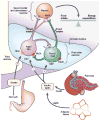Behavioral and pharmacologic therapies for obesity
- PMID: 20680034
- PMCID: PMC3031864
- DOI: 10.1038/nrendo.2010.121
Behavioral and pharmacologic therapies for obesity
Abstract
This article reviews novel developments in the behavioral and pharmacologic treatment of obesity and explores the potential contribution of genomics research to weight control. A comprehensive program of lifestyle modification, comprised of diet, physical activity and behavior therapy, induces a mean loss of 7-10% of initial weight in individuals with obesity. Two trials demonstrated that weight loss of this magnitude, combined with increased physical activity, substantially reduced the risk of developing type 2 diabetes mellitus in individuals with impaired glucose tolerance. A third trial is now investigating whether lifestyle intervention will reduce cardiovascular morbidity and mortality in overweight individuals who already have diabetes mellitus. Pharmacotherapy is recommended, in some patients, as an adjunct to lifestyle modification. Two medications-orlistat and sibutramine-are currently approved in the US for long-term weight loss. Both are efficacious when combined with lifestyle modification, although health concerns have been raised about the use of sibutramine. Several novel combination therapies, which target multiple hypothalamic pathways that regulate appetite and body weight, are currently under investigation. Genomic studies provide further evidence for the role of these pathways in the regulation of body weight. Identification of new genes controlling satiety and energy expenditure may yield valuable clues for the development of novel pharmacologic treatments.
Conflict of interest statement
Competing interests
T. A. Wadden declares an association with the following companies: Novo Nordisk, Orexigen Therapeutics, Vivus, Wyeth Pharmaceuticals. See the article online for full details of the relationships. The other authors declare no competing interests
Figures

References
-
- WHO. Obesity: Preventing and managing the global epidemic. WHO; Geneva: 1998. - PubMed
-
- Clinical guidelines on the identification, evaluation, and treatment of overweight and obesity in adults. National Institutes of Health. Obes Res. 1998;6(Suppl 2):51S–209S. [No authors listed] - PubMed
-
- National Heart, Lung, and Blood Institute (NHLBI) and the North American Association for the Study of Obesity (NAASO) The Practical Guide: Identification, Evaluation, and Treatment of Overweight and Obesity in Adults. National Institutes of Health; Bethesda, MD: 2000.
-
- Tuomilehto J, et al. Prevention of type 2 diabetes mellitus by changes in lifestyle among subjects with impaired glucose tolerance. N Engl J Med. 2001;344:1343–1350. - PubMed
Publication types
MeSH terms
Substances
Grants and funding
LinkOut - more resources
Full Text Sources
Medical

